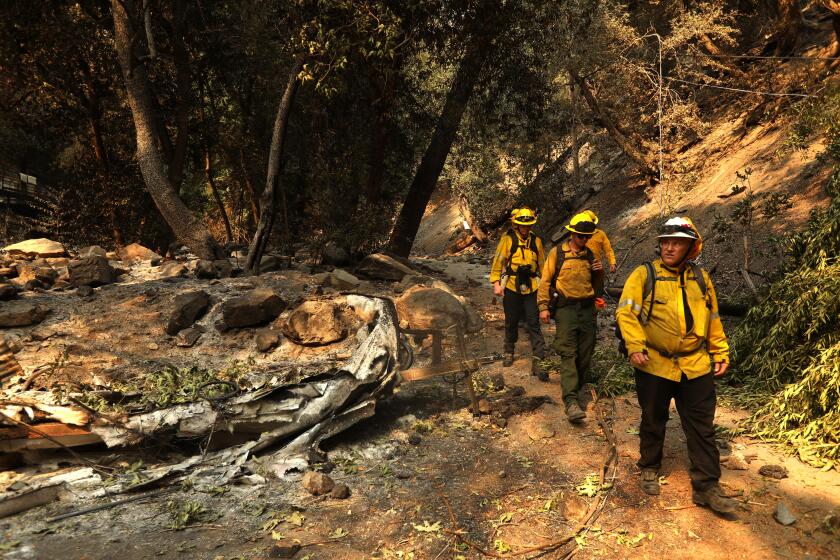Have ocean, will travel: Bolsa Chica Conservancy brings the sea to kids who’ve never seen it
When Grace Adams learned that many children in Orange County have never set eyes on the ocean — despite the 40 miles of coastline from Seal Beach to San Clemente — she knew she had to do something.
As executive director of the Bolsa Chica Conservancy, Adams has spent more than a decade working to educate the public about the wetlands and coastal ecology.
But not everyone was getting the message.
“I’ve heard directly from parents and kids that there are children within a 10-mile radius who have never seen the ocean, let alone know what a wetland is all about,” she said. “So our thought was it’d be great to have a wetlands-on-wheels program that we can take to them. If they can’t come to the wetlands, we’ll take it to them.”
So after 20 years of planning, in April the Bolsa Chica Conservancy launched the traveling science program Windows to Our Wetlands, which teaches students about the wetlands and conservancy through hands-on exhibits inside a converted van.
“There are many possibilities where we can take the van and touch more people who, for whatever reason, don’t have the ability to come to the wetlands themselves,” Adams said.
Inside the van are three tanks. The largest is a touch tank that students can dip their hands in to feel sea stars, snails, crabs and clams. On each side of the touch tank are two smaller aquaria — for looking, not handling — that house moon jellies and pipefish. Behind the three tanks is a TV screen playing a video of sea creatures too small to see with the naked eye, such as plankton and barnacles.
Outside the van are two displays. The first allows children to experience terrestrial animals in the wetlands, whether it’s by picking up a flat rock scorpion, albino rat snake or rosy boa (or watching them crawl and slither in their tanks), petting a coyote pelt or taxidermic red-tailed hawk.
The second outdoor display features interactive dioramas with colored water and moving marbles that illustrate the benefit of wetlands, and how watersheds make these ecosystems vulnerable to pollution.
“What you do in the mountains eventually comes down and affects everything else,” Adams said of the waste and pollution that flows from higher ground inland through the watershed to the wetlands. “So it’s really important to educate not just our young, but also the general public, about these coastal wetlands because at the end of the day it’s all connected.”
Debbie Thompson, a third-grade teacher at Esplanade Elementary School in Orange, said Windows to Our Wetlands has helped her students — the majority of whom come from low-income families — better understand the local ecosystem, and their part in it.
“Half of them haven’t seen the ocean, let alone played on the beach, which we take for granted here,” Thompson said at the unveiling of the program in April.
They were ready to get their hands wet.
“The students couldn’t wait to touch the sea stars, the sea snails and slugs and sea urchins inside the van,” she said. “They couldn’t stop talking about that squishy sea slug that wouldn’t stop moving and the slimy sea star.
“This experience exposed them to an enthusiasm to learn that the classroom can’t always provide… Some questions my students wouldn’t have been able to ask if they had just been in the classroom with the standard lesson.”
The conservancy’s mission is to not only get the children to the coastline but to get them to begin thinking of protecting natural resources.
“It has planted the seed of being appreciative of our own environment, and it’s ignited in them a greater awareness of their connection to the world at large,” she said. “Even though they’re just 20 miles from the beach, they didn’t realize they could impact the beach.”
The Windows to Our Wetlands program is sponsored by the EGBAR (Everything’s Gonna Be All Right) Foundation, the charitable arm of Simple Green, the Huntington Beach-based company that sells environmentally safe cleaning products.
“We jumped on the opportunity to spread the word about environmental education,” said Bruce FaBrizio, president and chief executive of Simple Green and founder of the EGBAR Foundation, which donated $75,000 and one of its fleet vans to develop and launch Windows to our Wetlands.
“The importance is that if you don’t know about it, you aren’t going to do anything about it,” FaBrizio said about the wetlands. “Once these kids know that what they do affects the environment around them, it opens up conversations at the dinner table that can never be turned away.”
To learn more about Windows to Our Wetlands, contact the Bolsa Chica Conservancy at (714) 846-1114.
--
Sign up for The Wild
We’ll help you find the best places to hike, bike and run, as well as the perfect silent spots for meditation and yoga.
You may occasionally receive promotional content from the Los Angeles Times.




